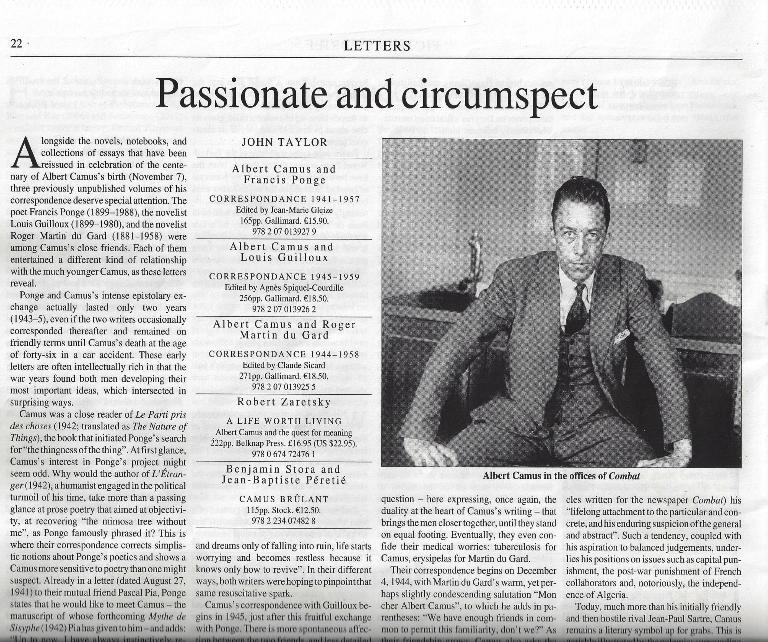 |
  Toàn những chi tiết thú vị. Một trang TV
cũ
J'ai subi un
deuxième choc littéraire en 1957, quand « L'étranger », d'Albert Camus,
a été
traduit en hongrois. Pour moi, c'était une révélation décisive qui m'a
radicalement influencé dans mes choix.. [Tôi bị cú sốc
văn chương thứ nhì khi Kẻ Xa Lạ
được dịch qua tiếng Hung, vào năm 1957. Đây
đúng là một cú mặc khải ảnh hưởng tới sự chọn lựa của tôi]
 by Robert Zaretsky In honor of
the French novelist, essayist, and philosopher November
7th, 2013 Robert Zaretsky, has published a new book, A Life Worth Living: Albert Camus and the Quest for Meaning, published by Harvard University Press in honor of the centenary of Camus's birth, today. Zaretsky also penned the following in honor of the French novelist, essayist, and philosopher. Robert
Zaretsky đã chơi 1 cuốn sách mới về Camus, “Một đời đáng sống: cuộc
truy tìm cái
nghĩa”, nhà xb ĐH Harvard Press. Bữa nay, 7 tháng 11, 2013, đúng SN
Camus 100 năm
trước đây, ông bèn đi một đường vinh danh Camus, người Tây, tiểu thuyết
gia, tiểu
luận gia và triết gia.
That boy,
the French Algerian writer and moralist Albert Camus, was born 100
years ago
today. In his last and unfinished novel, "The First Man", Camus
recreates not
just this scene, but one where he visits the grave of the father he
never knew,
killed in the Battle of the Marne when Camus was an infant. As Camus’s
fictional alter ego, Jacques Cormery, stares at the tombstone, all
around him,
“in the vast field of the dead, silence reigned.” Only when Cormery
hears a
noise made by another visitor does he see, as if for the first time,
the dates
under his father’s name: “1885–1914.” His silence deepens with the
realization
that the “man buried under that slab, who had been his father, was
younger than
he.” To gaze at
Camus’ own modest gravestone in the southern French village of
Lourmarin, the
inscription “1913–1960” delivers a similar shock. When he left us,
Camus was
younger than many of us are now; what his father left his son, his son
has left
us: a profound silence that surges through his remarkable writings and
life. This silence
is neither poetic nor mere rhetoric: it was a brute fact of Camus’s
life. Not
just the absent father, but also the present, yet mute mother. An
illiterate
cleaning woman, Catherine Camus spoke with difficulty — a handicap
perhaps due
to the shock of her husband’s death. The young Camus would sometimes
find his
mother “huddled in a chair, gazing in front of her” in the small
apartment they
shared with his illiterate grandmother and partly mute uncle in a
working class
neighborhood of Algiers. Her muteness, he recalled, seemed
“irredeemably
desolate.” The silent
mother haunts Camus’s writings: it is the dark matter toward which
everything
else is pulled. In "The Stranger", it is the death of Meursault’s
mother that
begins the unmaking of his life; it is the mostly wordless presence of
Dr.
Rieux’s mother in "The Plague" that prevents the unmaking of a world
swept by
disease. Shortly before his death, Camus described his literary goal:
to write
a book about “the admirable silence of a mother and one man’s effort to
rediscover a justice or a love to match this silence.” What did
Camus mean? That the depths of maternal silence can never be fully
plumbed by a
son? Camus always struggled with the fact that his life’s work was for
a woman
who could neither read nor talk. What he wanted most in the world was
for his
mother “to read everything that was his life and his being, that was
impossible. His love […] would forever be speechless.” This was no
less the case with his other love, Algeria. By the late 1950s, the
blood-dimmed
tide of revolution and repression had spread across Camus’s native
country.
Ever since the 1930s, when as a young journalist he wrote fiery
articles
denouncing France’s treatment of the Arab population, Camus had always
fought
for a French Algeria where the ideals of 1789 would be applied to
everyone,
Arab and French alike. The two peoples, he insisted, were condemned to
live
together. Yet it soon
became clear that two peoples were instead condemned to kill one
another. As
acts of terrorism and counter-terrorism ravaged his country, Camus flew
to
Algiers to call for a civilian truce. As he spoke inside a large hall,
a vast
crowd of fellow French Algerians surged towards the building, shouting
for his
death. Camus insisted on finishing the speech, but then had to be
rushed out of
the building by friends serving as bodyguards. When he
returned to France, he decided he would no longer speak or write about
the
conflict. To what end? Given the tragic character of the conflict,
silence was
all he had left. He did act privately, though, intervening dozens of
times with
the French authorities, pleading that they commute death sentences
dealt to
Arab prisoners. His appeals were mostly ignored, but the integrity of
his
efforts will never fade. During his
visit to Stockholm for the Nobel ceremony, however, circumstances did
force him
to speak. At a public forum, an Arab student began to assail him for
his
silence. Increasingly distraught and angry, Camus finally managed to
stop the
tirade, declaring: “I have always condemned terror. But I must also
condemn
terrorism that strikes blindly in the streets of Algiers, and which
might
strike my mother and family. People are now planting bombs in the
tramways of
Algiers. My mother might be on one of those tramways. If that is
justice, then
I prefer my mother.” The press
mangled the last line — “I believe in justice, but I’ll defend my
mother before
justice,” Le Monde
misreported — but both versions underscored Camus’s dilemma.
Words had proved at best useless, at worst complicit in the widening
gyre of
violence. As with his mother, who made him silently feel an “immense
pity
spread out around him,” so too did Camus feel for the Algerian student.
“I feel
closer to him,” he confessed, “than to many French people who speak
about
Algeria without knowing it. He knew what he was talking about, and his
face
reflected not hatred but despair and unhappiness. I share that
unhappiness.” In his Nobel
speech, Camus had said that silence, at certain moments, “takes on a
terrifying
sense.” Algeria was, for Camus, one of those moments. Words were worse
than
useless: incapable of stemming the catastrophe, they instead obscured
its
dimensions and meaning. Silence followed from his recognition that the
humiliated were on both sides in this conflict: the great majority of
French
Algerians — the working poor like his own family — as well as Arabs.
The truths
at play in Algeria were, for Camus, incompatible. On the
centenary of Camus’s birth, we are left with this truth, left with this
silence, left to us by an artist who died too soon.
|